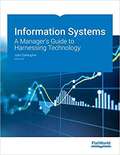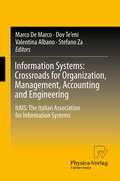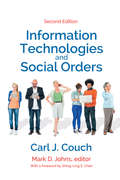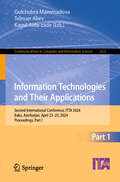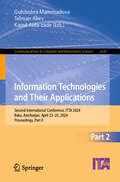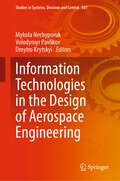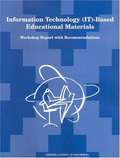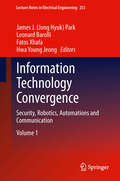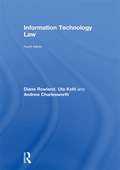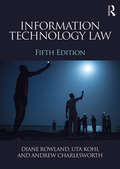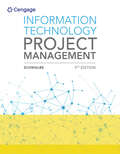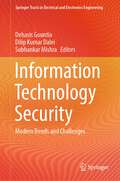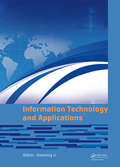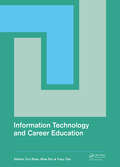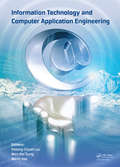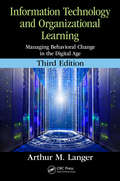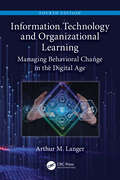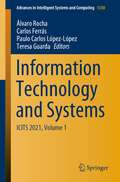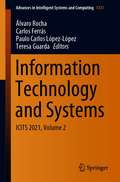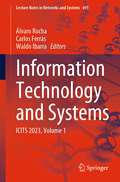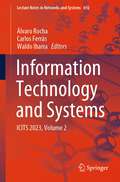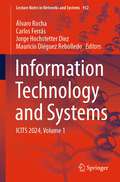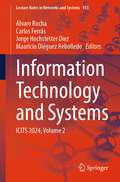- Table View
- List View
Information Systems: A Manager's Guide to Harnessing Technology Version 8.0
by John GallaugherKey Features: *Unique approach to information systems by leading with strategic thinking before diving into technical topics *Current and engaging case studies that challenge students to apply what they’ve learned *Coverage of not only strategy and technology basics, but also of critical concepts including data analytics, security, social media, the sharing economy, disruptive innovation, network effects and more *In-depth profiles on widely known firms such as Facebook, Amazon, Google, Netflix, Rent the Runway, and Zara.
Information Systems: Crossroads for Organization, Management, Accounting and Engineering
by Stefano Za Marco De Marco Dov Te'Eni Valentina AlbanoThis book examines a wide range of issues that characterize the current IT based innovation trends in organizations. It contains a collection of research papers focusing on themes of growing interest in the field of Information Systems, Organization Studies, Management, Accounting and Engineering. The book offers a multidisciplinary view on Information Systems with the aim of disseminating academic knowledge. It would be particularly relevant to IT practitioners such as information systems managers and IT consultants. The 12 sections cover a broad spectrum of topics including: eServices in Public and Private Sectors; Organizational Change and the Impact of ICT in Public and Private Sectors; Information and Knowledge Management; Human-Computer Interaction; Information Systems, Innovation Transfer, and New Business Models; Business Intelligence Systems, their Strategic Role and Organizational Impacts; New Ways to Work and Interact with the Internet; IS, IT and Security; Blending Design and Behavioral Research in Information Systems; Professional Skills, Certification of Curricula, Online Education and Communities; IS Design, IS Development, Metrics and Compliance; ICT4LAW: Information and communication technologies to help firms, public administrations, legislators and citizens to operate in a highly regulated world. The content of each section is based on a selection of original double-blind peer reviewed contributions.
Information Technologies and Social Orders (Communication And Social Order Ser.)
by Carl J. CouchAccording to Carl J. Couch, the history of human society is one of successive, sometimes overlapping, information technologies used to process the various symbolic representations that inform social contexts. Unlike earlier “media” theorists who ignored social context in order to concentrate on the information technologies themselves, Couch implements a consistent theory of interpersonal and intergroup relations to describe the essential interface between information technologies and the social contexts in which they are used. Couch emphasizes the formative capacities of information technologies across historical epochs and cultures, and places them within the major institutional relations of various societies. He views social orders as reflexively shaped by the information technologies that participants use, and as susceptible to mass brutality and oppression due to oligarchic control though he hopes technology will remain humane. The original edition of this manuscript was nearly complete at the time of Couch’s death and was brought to completion by two of his closest associates. Now after two decades, during which its impact is indisputable, it has been updated for a new generation of students and scholars. Additions include discussions on books in the digital age, social media, mobile telephones, recordings, participatory culture, and more.
Information Technologies and Their Applications: Second International Conference, ITTA 2024, Baku, Azerbaijan, April 23–25, 2024, Proceedings, Part I (Communications in Computer and Information Science #2225)
by Telman Aliev Gulchohra Mammadova Kamil Aida-ZadeThe two-volume set CCIS 2225 and 2226 constitutes the proceedings of the Second International Conference on Information Technologies and Their Applications, ITTA 2024, held in Baku, Azerbaijan, during April 23-25, 2024. The 51 full papers and 9 short papers presented were carefully reviewed and selected from 200 submissions. They were organized in the following topical sections: Part I - information technology in intelligent systems; and information technology in modeling. Part II - information technology applied in construction, industry, and engineering; and information technology in decision making.
Information Technologies and Their Applications: Second International Conference, ITTA 2024, Baku, Azerbaijan, April 23–25, 2024, Proceedings, Part II (Communications in Computer and Information Science #2226)
by Telman Aliev Gulchohra Mammadova Kamil Aida-ZadeThe two-volume set CCIS 2225 and 2226 constitutes the proceedings of the Second International Conference on Information Technologies and Their Applications, ITTA 2024, held in Baku, Azerbaijan, during April 23-25, 2024. The 51 full papers and 9 short papers presented were carefully reviewed and selected from 200 submissions. They were organized in the following topical sections: Part I - information technology in intelligent systems; and information technology in modeling. Part II - information technology applied in construction, industry, and engineering; and information technology in decision making.
Information Technologies in the Design of Aerospace Engineering (Studies in Systems, Decision and Control #507)
by Mykola Nechyporuk Volodymyr Pavlikov Dmytro KrytskyiThis book proposes a solution to the problem of incorrect use of automation tools to perform complex design work. Currently, a large number of start-up projects are non-professional design bureaus that show a huge amount of their achievements. In reality, most of these achievements burst like soap bubbles. This is due to the low-quality and inefficient use of information technology in this industry. The book highlights advanced information technologies in the fields of design, machine learning, and computer vision.
Information Technology (IT)-Based Educational Materials: Workshop Report with Recommendations
by Committee on Achieving Compatibility in IT-Based Educational MaterialsIn the last half-century, we have witnessed the birth and development of a new era: the information age. Information Technology (IT), the primary vehicle of the information age, has transformed the modern workplace and is pervasive in the development of new knowledge and wealth. IT has also dramatically influenced our capacity to educate. Yet, the application of IT in education has been disorganized and uneven. Pockets of innovation in localized environments are thriving, but the promise of open access, greatly enhanced teaching and learning, and large-scale use has not been realized. IT-Based Educational Materials: Workshop Report with Recommendations identifies critical components that support the development and use of IT-based educational materials. The report points to three high priority action areas that would produce a transitional strategy from our fragmented environment to an IT-transformed future in engineering education--Build Community; Create Organizational Enablers; and Coordinate Action. The report outlines six recommendations, including a call to establish a national laboratory to carry out evidenced-based investigations and other activities to insure interoperability and effective teaching and learning. The report stresses the need to pursue open architectures and to engage multidisciplinary researchers, including social scientists and others who address the transformation of faculty cultures. The report also discusses the need to engage users and developers of the IT-products in activities that are driven by student learning outcomes.
Information Technology Convergence: Security, Robotics, Automations and Communication
by Fatos Xhafa James J. Park Hwa Young Jeong Leonard BarolliInformation technology and its convergence issue is emerging rapidly as an exciting new paradigm with user-centric environment to provide computing and communication services. This area will be the most comprehensive topics with various aspects of advances in information technology and its convergence services. This book covers all topics as computational science and applications, electronics engineering, manufacturing technology, services, technical skill to control the robot, automatic operation and application, simulation and testing communication and many more.
Information Technology Convergence: Security, Robotics, Automations and Communication (Lecture Notes in Electrical Engineering #253)
by Fatos Xhafa James J. Jong Hyuk Park Hwa Young Jeong Leonard BarolliInformation technology and its convergence issue is emerging rapidly as an exciting new paradigm with user-centric environment to provide computing and communication services. This area will be the most comprehensive topics with various aspects of advances in information technology and its convergence services. This book covers all topics as computational science and applications, electronics engineering, manufacturing technology, services, technical skill to control the robot, automatic operation and application, simulation and testing communication and many more.
Information Technology Governance MBA Second Year - Madras University
by Institute of Distance Education - University of MadrasThe Master of Business Administration - Second Year - Optional Subject - Group-A - Information Technology Governance book by the Institute of Distance Education, University of Madras, provides a comprehensive overview of I T governance principles and practices. It introduces key frameworks such as COBIT 5, Val IT, and TOGAF, highlighting their role in aligning I T with business strategy. The book covers essential governance domains including strategic alignment, value delivery, risk management, resource management, and performance management. It also addresses modern IT sourcing strategies like outsourcing, offshoring, and co-sourcing. Overall, it equips MBA students with the knowledge to implement effective IT governance in organizations.
Information Technology Law
by Andrew Charlesworth Diane Rowland Uta KohlThis fourth edition of Information Technology Law has been completely revised in the light of developments within the field since publication of the first edition in 1997. Now dedicated to a more detailed analysis of and commentary on the latest developments within this burgeoning field of law, this new edition is an essential read for all those interested in the interface between law and technology and the effect of new technological developments on the law. New additions to the fourth edition include: analysis of regulatory issues and jurisdictional questions specific consideration of intermediary liability developments in privacy and data protection extension of computer crime laws developments in software patents open source software and the legal implications.
Information Technology Law
by Andrew Charlesworth Diane Rowland Uta KohlThe fifth edition of Information Technology Law continues to be dedicated to a detailed analysis of and commentary on the latest developments within this burgeoning field of law. It provides an essential read for all those interested in the interface between law and technology and the effect of new technological developments on the law. The contents have been restructured and the reordering of the chapters provides a coherent flow to the subject matter. Criminal law issues are now dealt with in two separate chapters to enable a more focused approach to content crime. The new edition contains both a significant amount of incremental change as well as substantial new material and, where possible, case studies have been used to illustrate significant issues. In particular, new additions include: * Social media and the criminal law; * The impact of the decision in Google Spain and the 'right to be forgotten'; * The Schrems case and the demise of the Safe Harbour agreement; * The judicial reassessment of the proportionality of ICT surveillance powers within the UK and EU post the Madrid bombings; * The expansion of the ICANN gTLDs and the redesigned domain name registration and dispute resolution processes.
Information Technology Project Management
by Kathy SchwalbeDevelop a strong understanding of IT project management as you learn to apply today's most effective project management tools and techniques with the unique approach found in Schwalbe's INFORMATION TECHNOLOGY PROJECT MANAGEMENT, 9E. Examine the latest developments and skills as you prepare for the Project Management Professional (PMP) or Certified Associate in Project Management (CAPM) exams. This edition reflects content from the latest PMBOK Guide, 6E and the Agile Practice Guide while providing a meaningful context. Examples from familiar companies featured in today's news discussion, exercises and cases reinforce learning. Time-saving template files assist in completing tasks. Agile information, a guide to using Microsoft Project 2016 and MindTap online resources will help you master today's most marketable IT project management skills.
Information Technology Security: Modern Trends and Challenges (Springer Tracts in Electrical and Electronics Engineering)
by Debasis Gountia Dilip Kumar Dalei Subhankar MishraThis book focuses on current trends and challenges in security threats and breaches in cyberspace which have rapidly become more common, creative, and critical. Some of the themes covered include network security, firewall security, automation in forensic science and criminal investigation, Medical of Things (MOT) security, healthcare system security, end-point security, smart energy systems, smart infrastructure systems, intrusion detection/prevention, security standards and policies, among others. This book is a useful guide for those in academia and industry working in the broad field of IT security.
Information Technology and Applications: Proceedings of the 2014 International Conference on Information technology and Applications (ITA 2014), Xian, China, 8-9 August 2014
by Xiaolong LiInformation Technology (IT) is the application of computers and telecommunications equipment to store, retrieve, transmit and manipulate data, often in the context of a business or other enterprise. IT has become one of the most fundamental technologies in today‘s social life, and there are many unsolved issues related to IT and its applications.Th
Information Technology and Career Education: Proceedings of the 2014 International Conference on Information Technology and Career Education (ICITCE 2014), Hong Kong, 9-10 October 2014
by Fun Shao Wise Shu Tracy TianInformation Technology and Career Education contains the contributions presented at the 2014 International Conference on Information Technology and Career Education (ICITCE 2014, Hong Kong, China, 9�10 October 2014). The book is divided into two main topics: information technology and vocational technology. Considerable attention is also paid to el
Information Technology and Computer Application Engineering: Proceedings of the International Conference on Information Technology and Computer Application Engineering (ITCAE 2013)
by Wen-Pei Sung Hsiang-Chuan Liu Wenli-YaoThis proceedings volume brings together some 189 peer-reviewed papers presented at the International Conference on Information Technology and Computer Application Engineering, held 27-28 August 2013, in Hong Kong, China. Specific topics under consideration include Control, Robotics, and Automation, Information Technology, Intelligent Computing and
Information Technology and Organizational Learning: Managing Behavioral Change in the Digital Age
by Arthur M. LangerFocusing on the critical role IT plays in organizational development, the book shows how to employ action learning to improve the competitiveness of an organization. Defining the current IT problem from an operational and strategic perspective, it presents a collection of case studies that illustrate key learning issues. It details a dynamic model for effective IT management through adaptive learning techniques—supplying proven educational theories and practices to foster the required changes in your staff. It examines existing organizational learning theories and the historical problems that occurred with companies that have used them, as well as those that have failed to use them.
Information Technology and Organizational Learning: Managing Behavioral Change in the Digital Age
by Arthur M. LangerBecause digital and information technology (IT) has become a more significant part of strategic advantage and workplace operations, information systems personnel have become key to the success of corporate enterprises, particularly with the pursuit of becoming more "digital." This book focuses on the vital role that technology must play in the course of organizational development and learning and on the growing need to integrate technology, particularly digital technology, fully into the culture of all organizations. Fundamentally this fourth edition takes an even stronger position than the previous editions that organizational learning is crucial to the success of what has been coined "digital transformation." Companies are struggling to understand what it means to "be digital." Their technology personnel go far beyond the traditional IT staff into areas such as artificial intelligence (AI), machine learning (ML), and natural language processing (NL). These three functions now fall under the auspices of "data science," which is now at the center of allowing companies to become more data dominant as is necessary for survival. While traditional IT personnel have long been criticized for their inability to function as part of the business, they are now vital to assist in the leadership of digital transformation. It could be a costly error to underestimate the technical skills needed by IT staff to ensure successful digital transformation. In fact, subsequent chapters will highlight the technical challenges needed to build new architectures based on 5G, blockchain, cloud computing, and eventually quantum processing. The challenge then is to integrate business and technical IT staff via cultural assimilation and to strategically integrate advanced computing architectures. This fourth edition includes new topics such as the future of work that addresses the challenges of assimilating multiple generations of employees and how to establish working cultures that are more resilient and adaptive and can be configured as a platform driven by data assets.
Information Technology and Systems: ICITS 2021, Volume 1 (Advances in Intelligent Systems and Computing #1330)
by Álvaro Rocha Teresa Guarda Carlos Ferrás Paulo Carlos López-LópezThis book is composed by the papers written in English and accepted for presentation and discussion at The 2021 International Conference on Information Technology & Systems (ICITS 21), held at the Universidad Estatal Península de Santa Elena, in Libertad, Ecuador, between the 10th and the 12th of February 2021.ICITS is a global forum for researchers and practitioners to present and discuss recent findings and innovations, current trends, professional experiences and challenges of modern information technology and systems research, together with their technological development and applications.The main topics covered are information and knowledge management; organizational models and information systems; software and systems modelling; software systems, architectures, applications and tools; multimedia systems and applications; computer networks, mobility and pervasive systems; intelligent and decision support systems; big data analytics and applications; human–computer interaction; ethics, computers & security; health informatics; and information technologies in education.
Information Technology and Systems: ICITS 2021, Volume 2 (Advances in Intelligent Systems and Computing #1331)
by Álvaro Rocha Teresa Guarda Carlos Ferrás Paulo Carlos López-LópezThis book is composed by the papers written in English and accepted for presentation and discussion at The 2021 International Conference on Information Technology & Systems (ICITS 21), held at the Universidad Estatal Península de Santa Elena, in Libertad, Ecuador, between the 10th and the 12th of February 2021. ICITS is a global forum for researchers and practitioners to present and discuss recent findings and innovations, current trends, professional experiences and challenges of modern information technology and systems research, together with their technological development and applications. The main topics covered are information and knowledge management; organizational models and information systems; software and systems modelling; software systems, architectures, applications and tools; multimedia systems and applications; computer networks, mobility and pervasive systems; intelligent and decision support systems; big data analytics and applications; human–computer interaction; ethics, computers & security; health informatics; and information technologies in education.
Information Technology and Systems: ICITS 2023, Volume 1 (Lecture Notes in Networks and Systems #691)
by Álvaro Rocha Carlos Ferrás Waldo IbarraThis book is composed by the papers written in English and accepted for presentation and discussion at The 2023 International Conference on Information Technology & Systems (ICITS'23), held at Universidad Nacional de San Antonio Abad del Cusco, in Cusco, Peru, between the 24th and the 26th of April 2023. ICIST is a global forum for researchers and practitioners to present and discuss recent findings and innovations, current trends, professional experiences and challenges of modern information technology and systems research, together with their technological development and applications. The main topics covered are: information and knowledge management; organizational models and information systems; software and systems modelling; software systems, architectures, applications and tools; multimedia systems and applications; computer networks, mobility and pervasive systems; intelligent and decision support systems; big data analytics and applications; human–computer interaction; ethics, computers & security; health informatics; information technologies in education, and Media, Applied Technology and Communication.
Information Technology and Systems: ICITS 2023, Volume 2 (Lecture Notes in Networks and Systems #692)
by Álvaro Rocha Carlos Ferrás Waldo IbarraThis book is composed by the papers written in English and accepted for presentation and discussion at The 2023 International Conference on Information Technology & Systems (ICITS'23), held at Universidad Nacional de San Antonio Abad del Cusco, in Cusco, Peru, between the 24th and the 26th of April 2023. ICIST is a global forum for researchers and practitioners to present and discuss recent findings and innovations, current trends, professional experiences and challenges of modern information technology and systems research, together with their technological development and applications. The main topics covered are: information and knowledge management; organizational models and information systems; software and systems modelling; software systems, architectures, applications and tools; multimedia systems and applications; computer networks, mobility and pervasive systems; intelligent and decision support systems; big data analytics and applications; human–computer interaction; ethics, computers & security; health informatics; information technologies in education, and Media, Applied Technology and Communication.
Information Technology and Systems: ICITS 2024, Volume 1 (Lecture Notes in Networks and Systems #932)
by Álvaro Rocha Carlos Ferrás Jorge Hochstetter Diez Mauricio Diéguez RebolledoThis book is composed by the papers written in English and accepted for presentation and discussion at The 2024 International Conference on Information Technology & Systems (ICITS'24), held at Universidad de La Frontera, in Temuco, Chile, between the 24th and the 26th of January 2024. ICIST is a global forum for researchers and practitioners to present and discuss recent findings and innovations, current trends, professional experiences, and challenges of modern information technology and systems research, together with their technological development and applications. The main topics covered are information and knowledge management; organizational models and information systems; software and systems modeling; software systems, architectures, applications and tools; multimedia systems and applications; computer networks, mobility and pervasive systems; intelligent and decision support systems; big data analytics and applications; human–computer interaction; ethics, computers & security; health informatics; information technologies in education, and Media, Applied Technology and Communication. The primary markets of this book are postgraduates and researchers in Information Systems and Technologies domains. The secondary markets are undergraduates and professionals as well in Information Systems and Technologies domains.
Information Technology and Systems: ICITS 2024, Volume 2 (Lecture Notes in Networks and Systems #933)
by Álvaro Rocha Carlos Ferrás Jorge Hochstetter Diez Mauricio Diéguez RebolledoThis book is composed by the papers written in English and accepted for presentation and discussion at The 2024 International Conference on Information Technology & Systems (ICITS'24), held at Universidad de La Frontera, in Temuco, Chile, between the 24th and the 26th of January 2024. ICIST is a global forum for researchers and practitioners to present and discuss recent findings and innovations, current trends, professional experiences, and challenges of modern information technology and systems research, together with their technological development and applications. The main topics covered are information and knowledge management; organizational models and information systems; software and systems modeling; software systems, architectures, applications and tools; multimedia systems and applications; computer networks, mobility and pervasive systems; intelligent and decision support systems; big data analytics and applications; human–computer interaction; ethics, computers & security; health informatics; information technologies in education, and Media, Applied Technology and Communication. The primary markets of this book are postgraduates and researchers in Information Systems and Technologies domains. The secondary markets are undergraduates and professionals as well in Information Systems and Technologies domains.
